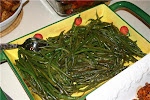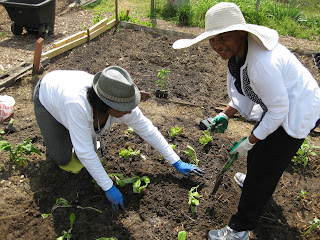Food
and Health
Cutting up food into smaller pieces may help people
control their weight more easily because they are more satisfying to eat than one large
piece with the same number of calories, according to a new study presented at a
conference this week. http://www.medicalnewstoday.com/articles/247693.php
Artificial sweeteners, also known as non-nutritive sweeteners, may help people reach their body weight goal, and also maintain a healthy body weight, researchers reported in two journals, Circulation and Diabetes Care. However, users have to make sure they do not "compensate" by eating high-calorie foods. An example of "compensating" might be ordering a diet coke and also a large slice of chocolate cake. http://www.medicalnewstoday.com/articles/247662.php
Is a calorie really just a calorie? Do calories from a soda have the same effect on your waistline as an equivalent number from an apple or a piece of chicken? For decades the question has percolated among researchers — not to mention dieters. It gained new momentum with a study published last month in The Journal of the American Medical Association suggesting that after losing weight, people on a high-fat, high-protein diet burned more calories than those eating more carbohydrates. http://www.nytimes.com/2012/07/10/health/nutrition/q-and-a-are-high-protein-low-carb-diets-effective.html?_r=1&src=me&ref=health
Food
Safety
A small company is trying to bring to
market a genetically engineered apple that does not turn brown when sliced or
bruised. But it has much of the rest of the apple industry seeing red…the U.S.
Apple Association, which represents the American apple industry, opposes
introduction of the product, as do some other industry organizations. They say
that, while they do not believe that the genetic engineering is dangerous, it
could undermine the fruit’s image as a healthy and natural food, the one that
keeps the doctor away and is as American as, well, apple pie. http://www.nytimes.com/2012/07/13/business/growers-fret-over-a-new-apple-that-wont-turn-brown.html?ref=health
The three types of bacteria - Salmonella Infantis,
Salmonella Newport and Salmonella Lille - have been traced to baby poultry from
the Mt. Healthy Hatchery in Ohio, which sells chicks and ducklings through mail
orders, according to the Centers for
Disease Control and Prevention. The
number of people sickened in each state is as follows: Alabama (4), Arizona
(1), Delaware (1), Georgia (5), Illinois (1), Indiana (3), Kansas (1), Kentucky
(5), Louisiana (1), Maine (4), Maryland (1), Massachusetts (2), Michigan (2),
Nebraska (1), New Jersey (1), New York (16), North Carolina (14), Ohio (37),
Pennsylvania (11), Rhode Island (1), South Carolina (1), Tennessee (11), Texas
(2), Vermont (1), Virginia (10) and West Virginia (7). http://www.foodsafetynews.com/2012/07/more-victims-in-live-poultry-salmonella-outbreak/
Food
Assistance
As expected, the
House version of the 2012 Farm Bill contains deep cuts to
the Supplemental Nutrition Assistance Program (SNAP, formerly called food
stamps). With its $16 billion proposed cut in this critical safety net, the
House leadership is about three times as cruel as the Senate, which already approved
a $4.5 billion reduction over 10 years. If the House gets its way, 2 to 3
million Americans could
go hungry. In addition, 280,000 kids could get kicked off the school meal
program because their families' eligibility is tied to SNAP. And speaking of
kids, almost half of all SNAP participants are children. http://www.appetiteforprofit.com/2012/07/09/3-steps-to-protecting-food-stamps/
Nearly one
in five Alabama residents is getting food stamps, and the number is growing
again after declining for a few months. Experts say it's too early to tell if
the one-month increase is merely a bump on the road to economic recovery or a
trend. http://www.thestreet.com/story/11611338/1/number-of-alabamians-on-food-stamps-growing-again.html
Senate Budget Committee ranking member Jeff Sessions
(R-Ala.) slammed the Department of Agriculture (USDA) Thursday for reportedly
conducting an aggressive outreach campaign to increase the number of people on
food stamps, and said news of this campaign means Congress needs to look more
closely at federal food aid programs. http://thehill.com/blogs/floor-action/senate/237649-sen-sessions-slams-usdas-radio-spots-pushing-food-stamps
Congress’s election-year calendar and
conflicts over food stamps may make this week’s House Agriculture Committee
consideration of a farm-aid and nutrition bill the measure’s last advance
before current law expires at the end of September. House leaders would rather sidestep divisions
over food-stamp spending and delay the bill until after the November election,
analysts and lobbyists say. Appropriations legislation and possible votes on
repealing President Barack Obama’s health-care plan will compete for time. Given
the political thorniness of the agriculture bill, a series of short-term
extensions is possible, said Harwood Schaffer, an assistant professor at the
University of Tennessee.
http://www.bloomberg.com/news/2012-07-10/food-stamps-fight-elections-combine-to-slow-farm-law.html
This
week, more than 400 of America's culinary leaders were on Capitol Hill to ask
Congress to protect funding for the Supplemental Nutrition Assistance Program
(SNAP, formerly known as food stamps). Today, nearly half of the 46 million
Americans relying on SNAP are children. Chefs
and restaurateurs such as Hugh Acheson, Daniel Boulud, Sean Brock, Floyd
Cardoz, Jennifer Carroll, Tom Colicchio, Alexandra Guarnaschelli, Stephanie
Izard, Food Network President Brooke Johnson, Sandra Lee, Danny Meyer, Mary Sue
Milliken, Michael Mina, Marc Murphy, Pat & Gina Neely, Charlie Palmer,
Rachael Ray, Marcus Samuelsson and Bryan Voltaggio joined the national
anti-hunger nonprofit Share Our Strength in urging lawmakers to protect funding
for this nutrition program that helps feed America's children. http://www.fastcasual.com/article/197277/Share-Our-Strength-restaurateurs-ask-Congress-to-protect-food-stamp-program





























































































